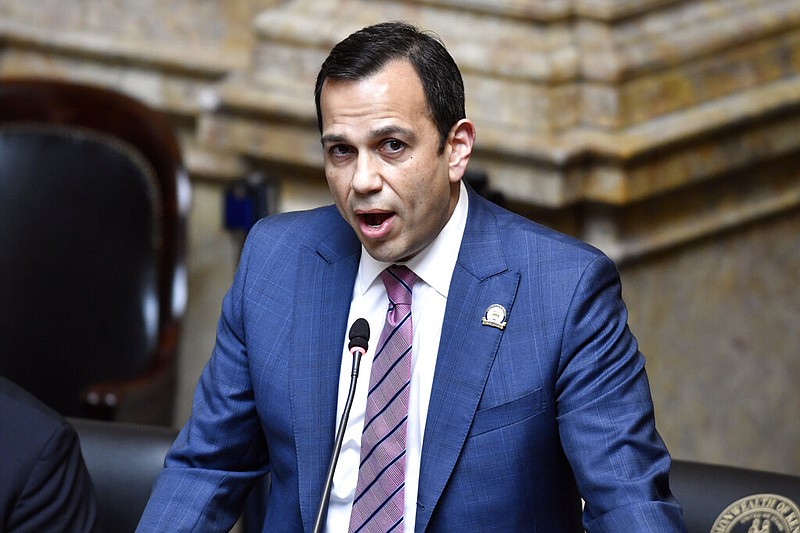Tennessee's new health commissioner declined to explain this week why the state will halt federal funds historically given to partner nonprofits for HIV testing and prevention — drawing criticism from a Democratic senator who said Gov. Bill Lee's administration is playing "culture-war politics" with the well-being of Tennesseans.
Dr. Ralph Alvarado, who took over as commissioner for the Tennessee Department of Health effective Jan. 16, appeared before a legislative committee Wednesday. The meeting began with the chairman acknowledging the interest around the HIV funding situation and requesting that the 25-minute meeting stay focused on getting to know Alvarado.
Questions related to HIV services could be asked during a March 15 meeting when Alvarado is scheduled to appear before the committee to discuss budgeting, the chairman said.
In a letter dated the day after Alvarado assumed the role of commissioner, the Tennessee Department of Health informed partner nonprofits the state would forfeit millions in grant money from the U.S. Centers for Disease Control and Prevention that's historically been used to fund HIV surveillance, testing and prevention.
During Wednesday's meeting, Alvarado shared his background, including growing up a son of immigrants in California and then moving to Kentucky, where he was a practicing physician for 30 years and later became a hospital administrator and held office as a Republican in the Kentucky state Senate starting in 2015.
Following Alvarado's introduction, Sen. Jeff Yarbro of Nashville -- the sole Democrat on the nine-member committee -- urged Alvarado to address HIV services funding before March.
"I'm not sure whether that's a decision you signed off on or inherited, but in any event, it's a decision that the aftermath is going to be one that you have to deal with and we have to deal with," Yarbro said.
(READ MORE: Tennessee lawmakers look for motive in HIV funding shift)
Alvarado noted the funding cut doesn't affect the federally funded Ryan White program, which provides medical care and treatment for people living with HIV/AIDS who are uninsured or under-insured.
While the recent decision to end the CDC funding for other HIV services was abrupt, Alvarado said, the current funding will continue through May 31.
"The state's examining how an effective program will be implemented at the state level and will notify the community of specifics as soon as that's appropriate," Alvarado said as the meeting adjourned.
After the committee meeting, Alvarado declined to answer reporters' questions as spokesperson Dean Flener said the commissioner had another appointment.
Yarbro expressed frustration to reporters outside the meeting about the department's lack of explanation for ending the CDC grant and how the state plans to replace those services.
"I don't think anyone should wait until March 15 to get better answers than what is being planned. There are organizations from Johnson City to Memphis to Nashville to rural areas that are going to be affected and have trouble figuring out how they're going to keep operations going," Yarbro told reporters, pointing to reports that suggest connections to Planned Parenthood factored into the decision.
Following last week's news that funding would be cut, The Associated Press reported Planned Parenthood -- a longtime target of Republican lawmakers who dislike the group's abortion advocacy -- was one of the nonprofit organizations that received a portion of the funds for HIV prevention efforts. Documents obtained by the AP show that in November, the state wanted to sever all direct and indirect financial ties with the organization.
(READ MORE: Alabama's largest HIV health care unit expanding)
"I don't know why the governor would care who is getting out there and trying to help Tennesseans not get sick and die of AIDS. That seems like something we should all be for and all be doing everything we can to support," Yarbro told reporters, adding the CDC grants were approved under both Republican and Democratic presidents.
A Planned Parenthood spokesperson did not return a request for comment on the issue.
Cempa Community Care is one of several Chattanooga providers affected by the decision. In a letter to Alvarado dated Jan. 18, CEO Shannon Stephenson said the loss of CDC grant funds would greatly reduce HIV prevention programs in both urban and rural areas of Southeast Tennessee.
"Cempa has 14 staff dedicated to programs combating HIV, and in 2022 alone, we served over 4,000 clients through those programs," Stephenson's letter said. "Across the state, there are 17 community health organizations providing similar care, and this cut, should it take place, will leave some of our most vulnerable populations at increased risk."
Staff writer Andy Sher contributed to this report.
Contact Elizabeth Fite at efite@timesfreepress.com or 423-757-6673.
